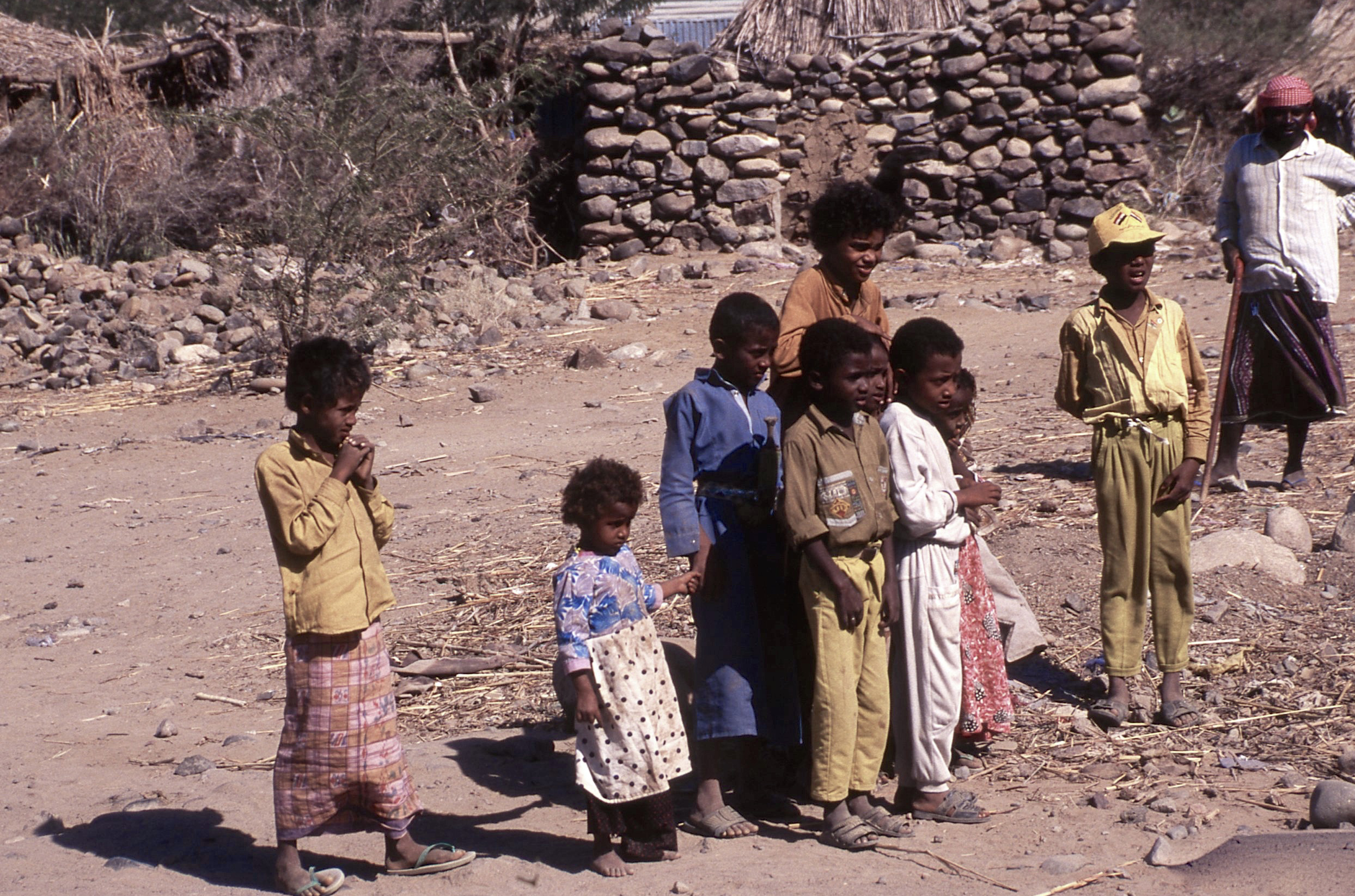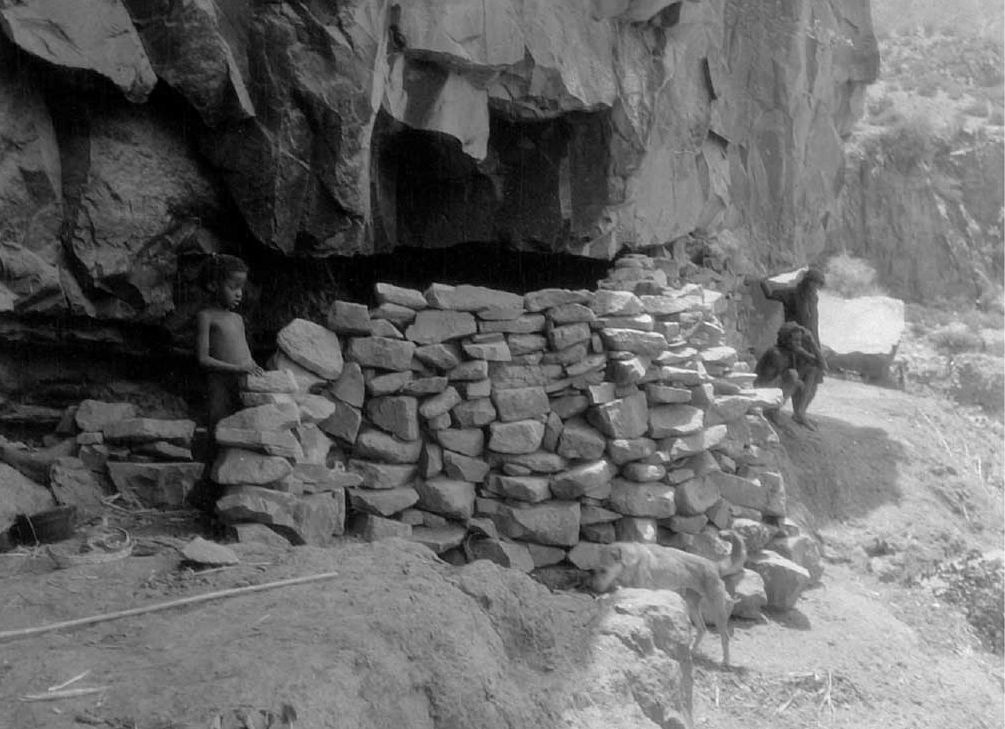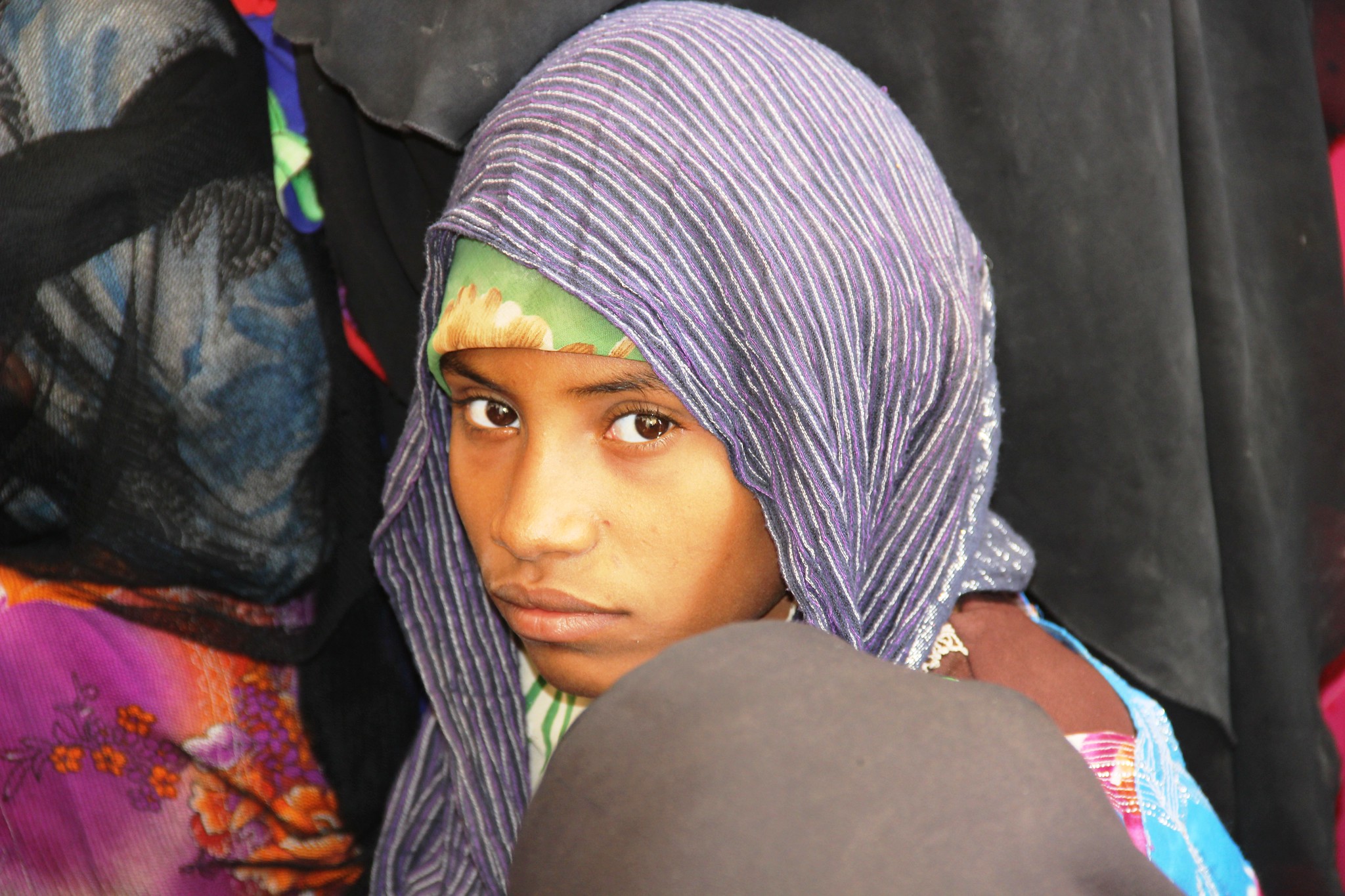Who are the (the marginalized) Al-Muhamasheen?
Al-Muhamasheen are a group within the Yemeni society that are often pejoratively referred to by the term al-Akhdam (the servants). This group has been systematically targeted and discriminated against more than any other group in the history of Yemen. Not only have they been treated as second class citizens, but sometimes they are not considered citizens at all.
They live on the margins of social, political, and economic life in Yemen. This has led them to retreat and live in semi-isolated settlements, often living in huts made out of straw, tin, or other cheap materials, which do not protect them from the cold of winter nor the heat of summer (especially in extremely hot governorates, such as Hodeidah, Aden, Lahj, Abyan, and Hadramout). They are also susceptible to deadly diseases and epidemics as a result of their dire situation, where they mostly live without electricity, clean water, sanitation, clean food, and are deprived of health and education services.

Historical Background:
Many of the Muhamasheen believe that they are of Yemeni decent from the region of Zabid. Historical sources mention that they are some of the remnants of Ethiopian soldiers who invaded Yemen in 525 CE, and were later enslaved by the Ziyadia state in the city of Zabid. The Bani Najah dynasty ruled over Zabid since 403–553 AH / 1012–1158 CE, a state founded by Prince Najah Mawla Morjane Al-Habashi, Prince Bani Ziad’s chamberlain, after he had killed his sire Murjan and his rival Nafis, who both killed the prince Abdullah Ibn Abi Al-Jaish Al-Ziyad.
When the Najah dynasty took power in Zabid and the Tihama plains they brought in more people from Ethiopia. They persecuted the Yemenis, looted their property, took women as captives, and enslaved the indigenous Yemeni population. This led the people to form resistance groups against the Najahi state, led by the rebel Ali Bin Mahdi Al-Hymiari Al-Zabidi, who rallied Yemenis from the Tihama plains and the mountainous areas. After a four-year war, Ali was able to overthrow the Najah dynasty, and sentenced them to a life of slavery in which they would become servants of Yemeni society. He also issued a decree that forced them to build their homes on the outskirts of cities and villages, and was the first to call them Akhdam in recorded Yemeni history.
Regardless of what all of these historical accounts say, whether they attribute the Muhamasheen to the remnants of migrations from the Horn of Africa, to the remnants of the Ethiopian campaign against Yemen, or claim that they are dark skinned indigenous people, no-one can deny the fact that they have lived in Yemen for hundreds of years. One generation after next, the Muhamasheen have inherited racism and contempt from society, which treats them as a pariah class when compared to all other classes.

The Muhamasheen population:
There are no accurate statistics on the number of Muhamasheen in Yemen for several reasons. First, there is no effective system in place for collecting statistical data from the relevant ministries and government statistical offices, and the existing statistical system is too general and not detailed. Second, the collection of official statistics has stalled since the last census in Yemen in 2004, when the population reached 19,685,161, according to the National Information Center of the Republic of Yemen. Third, even these outdated statistics do not provide any data related to race or religion, as the ruling regimes in Yemen have historically believed that addressing such details will create conflicts that could lead to division in society. This makes it difficult to obtain accurate information on the reality of this group, making estimates the only data available for researchers. There are different estimates of the numbers of Muhamasheen in Yemen, with estimates ranging from 500,000 to 3.5 million individuals, anywhere between 1.8% and 12.7% of the population.
The Social Situation:
The Muhamasheen are among the poorest in the country, and it is rare to find one in a job outside of the cleaning sector, a field of work that other social groups are reluctant to engage in.
A survey of the Muhamasheen community in Yemen prepared by UNICEF, which covered 9,200 households (51,406 people), revealed high levels of poverty and low levels of literacy and school enrollment. It revealed very poor family living conditions and poor access to basic social services. Only one in five people aged 15 or older can read or write, and only half of the children aged 6 to 17 are enrolled in school. As for birth registration, it was found to be as low as 9%. When it came to housing, three-quarters of the households surveyed live in one-room houses. Half of these households depend on exposed water sources such as dams, streams, or wells. Less than a tenth of them receive water from major water projects, and only two out of five homes were found to contain a toilet. Although one-third of the country’s citizens receive social assistance, only one-fifth of the Muhamasheen families receive social assistance, because the poor and needy from other groups are given priority over them.
Forms of Racism Against the Muhamasheen:
Racism against the Muhamasheen is evident in the intolerant and prejudiced dealings of other groups with them, especially from people of lighter color skin. This intolerance comes in different forms, including verbally insulting them by using degrading labels such as Akhdam. This abuse is not limited to adults, but is used on children on the street, in schools, and everywhere else. It is a kind of curse that reminds those belonging to the Muhamasheen community that they do not belong in Yemeni society, a society in which many prejudices are drawn and adopted on a linguistic basis.
The Muhamasheen are marginalized from any political or administrative role, and are always confined to jobs within the cleaning sector. Despite the participation of a representative of the Muhamasheen in the national dialogue conference that was held in Yemen under the auspices of the United Nations after President Ali Saleh stepped down from power in 2012, and despite the demands to allocate 10% of jobs to this group brought by the president of the Muhamasheen Union, the final draft of the new constitution did not contain any quota allocated to them. Even if society has begun to absorb the concepts of racism, it has yet to lay any foundations to overcome it in the future.
In a society proud of its tribal affiliations, the Muhamasheen are seen as a group with no origins, and are dealt with accordingly. The Muhamasheen have always been deemed by society in Yemen having no true origins, and thus are viewed as unworthy of having many social rights. They are not given the freedom to discuss their social issues, and are viewed by some as being there for the sole purpose of serving others, and are even viewed sometimes as animals.
Many of the members of the Muhamasheen are subjected to torture, beatings, and insults, while the law and its agencies turns a blind eye at the violence directed against them. The judicial and security system often tolerates perpetrators in cases of the systematic rape of Muhamasheen men and women, since the victim is often not viewed as human according to their racist perspectives, helping to exacerbate crimes against them. According to organizations involved in monitoring violations against the Muhamasheen, judicial and security services are notified in many of these cases, but do nothing.
Furthermore, sometimes perpetrators destroy the homes of the Muhamasheen and force their families to leave. These heinous crimes are always vilified by society when they occur to a member of one of the other classes in Yemen, but when the victim is of the Muhamasheen group, society chooses to not only ignore it, but sometimes punish the victim.
The Suffering of the Muhamasheen in the Current War:
While the ongoing conflict has affected the lives of all Yemenis, it has affected the Muhamasheen and other vulnerable groups disproportionately. Documented cases by UN experts show that they have been exposed to additional risks, such as working near front lines, moving to uninhabitable areas, or joining various armed groups in the conflict (UN, 2019, 285). This is in addition to other serious risks, some related to the plight of war in general, and others related to being subjected to deliberate violations relating to their marginalization, which makes their lives an unbearable hell.
The war has exacerbated their suffering, and, despite their prominence in humanitarian publications, they are largely excluded from aid campaigns and deliberately removed from humanitarian lists. They have also been removed from their already low-wage jobs, especially in the cleaning sector and other jobs that the wider Yemeni society classifies as inferior. Large groups of Muhamasheen have been displaced by the conflict in Aden, Taiz, and Hodeidah, and have struggled to reach refugee camps due to racism by refugees from other groups, having instead to take shelter in public institutions such as schools. Muhamasheen women are also more vulnerable to sexual violence and harassment by combatants, especially at checkpoints.

According to UN reports, one of the direct effects of the conflict is the recruitment of Muhamasheen to various frontline armed groups. Experts were able to document cases in which individuals were forcibly recruited into the groups, while others voluntarily joined for financial incentives. The report also mentions cases of arbitrary arrests, kidnappings, beatings, and torture, often ending in death. The war was able to attract children and other vulnerable groups in society to join it, either by force, intimidation or financial incentives. All these factors make the Muhamasheen among the most vulnerable groups that surrender to the will of the conflicting armed groups.
The National Union of the Marginalized issued a detailed report which monitored the violations that occurred to the Muhamasheen from 2015 to 2019. These violations included abduction, forced displacement, the demolition of houses, and the injury and killing of some members of the group, including children, women, and the elderly. Several members of the group were also subjected to inhuman and degrading treatment and harassment by some tribes and armed thugs affiliated with the government and the Houthis. The leadership of the Southern Transitional Council STC described the Muhamasheen “Akhdam” as mercenaries, which could incite violence, hatred, and genocide against them.



